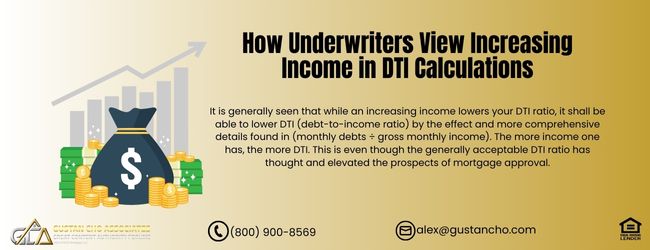How Do Underwriters Calculate Qualified Income For Mortgages

This guide covers how do underwriters calculate qualified income of borrowers. The way how do underwriters calculate qualified icome of borrowers is with documented and verified income. There are strict mortgage regulations on how do underwriters calculate qualified income of borrowers on government and conventional loans. Chad Bush, a dually licensed loan officer and real estate agent at GCA FORUMS Mortgage Group explains about the importance of qualified income as follows:
Days of stated income home loans on government and conventional loans have long passed. Non-QM loans now returned with alternative loan programs. Non-QM loans are alternative non-conforming loan programs that are becoming very popular.
Only qualified income will count to be used when calculating debt-to-income ratios. Undocumented cash income cannot be counted. Only adjusted gross income after unreimbursed business expenses can be used. Due to only adjusted gross income being used as qualified income, business owners and self-employed borrowers often had trouble qualifying for a mortgage. NON-QM Loans and Bank Statement Mortgage Loans for self-employed borrowers are back. GCA FORUMS Mortgage Group is a national mortgage company licensed in multiple states with no overlays on government and conventional loans. However, the ways on how do underwriters calculate qualified income of borrowers are pretty much the same for all lenders underwriting FHA, VA, USDA, and Conventional loans.
How Do Underwriters Calculate Qualified Income: The Importance of Qualified Income
Qualified income will be the most important determinant, along with your credit scores, determining how much of a home you can afford. It is not how much you make a month but how much qualified income can be verified by the mortgage underwriter. Chad Burns, a dually licensed loan officer and real estate agent at GCA FORUMS Mortgage Group explains qualified income as follows:
All qualified income in the mortgage approval process needs to be verified. Cash income cannot be used for qualified income qualification purposes. Declining income is a bad sign for underwriters and may not be eligible as qualified income.
Mortgage underwriters need to determine and use their discretion that the income used as qualified income is likely to continue for the next three years. Other income, such as part-time, bonus, and overtime, can be used as qualified income as long as the borrowers have a two-year history and the income is likely to continue. Speak With Our Loan Officer About Your Mortgage
How Do Underwriters Calculate Qualified Income of Hourly and Salaried Wage Earners
If a borrower is a full-time hourly employee, the way mortgage underwriters calculate is by taking the amount of the hourly rate and multiplying it by 40 hours. Then multiply that figure by 52 weeks. Then divide it by 12 months to get the monthly gross income. Do not count overtime income or bonuses. Overtime income and bonus income are different subject matters. There are other ways of calculating bonuses, overtime, part-time, and other income in qualified income qualifications. The borrower needs two years of seasoning to use a second full-time job, bonus, overtime, part-time, or other income. The other income cannot be declining. The mortgage underwriter needs to make a call and has the discretion on whether the income will likely continue for the next three years. Lenders must ensure the borrowers will remain employed and pay their new home mortgage payment without any stress or financial difficulty.
How Do Underwriters Calculate Qualified Income of Salary Wage Earners
If you are an employee who is on salary, this is how you calculate your qualified income for mortgage calculation. If the mortgage loan borrower gets their wages twice a month, the paycheck is multiplied by 2, yielding the qualified income. If the salaried employee is paid every two weeks, the paycheck must be multiplied by 26 weeks and then divided by 12 months to yield the monthly gross income to qualify for the mortgage loan.
How Do Underwriters Calculate Qualified Income on Overtime, Bonus, Part-Time, and Commission Income
Other income, such as overtime, bonus, part-time, and commission income, is more complicated to qualify for. The mortgage loan originator must ensure he or she qualifies it the same way the mortgage underwriter will. Mortgage underwriters will not count overtime or other income unless borrowers have a two-year history. The other income cannot be declining or inconsistent. Overtime income, part-time income, bonus income, or commission income will have the likelihood of continuing for the next three years.
How Do Underwriters Calculate Qualified Income on Overtime and Other Income Guidelines
Nobody can guarantee that borrowers’ overtime and other income will continue. What the mortgage underwriter is going to request is a verification of employment from Human Resources. On the VOE, it will request to Human Resources representative to state the overtime. It will also ask if other income is likely to continue, and the likelihood it will continue for the next three years is very likely. If the HR spokesperson is unwilling to state that verbiage, overtime, and other income cannot be used as additional income in the qualified income qualification. If that overtime income is allowed, then it is calculated to take the sum of the two years of overtime income and divide it by 24 months. If the overtime or other income is last in the most recent year than the previous year, then the most current year overtime income or other income is only used, and it is divided by 12 months to determine the qualified income. Click Here To Apply For A Mortgage Loan With Us
How To Calculate Qualified Income For Self-Employed Mortgage Borrowers
If the borrower is self-employed or a 1099 wage earner, two years of tax returns and income as 1099 is mandatory. Lenders will take the adjusted income after all deductions that filers report to the Internal Revenue Service. Lenders will go off the Schedule C of the tax returns from the previous two years. Dustin Dumestre of F-1 Lenders, a dba of NEXA Mortgage, LLC explains about how mortgage underwriters calculate qualified income to determine the borrower’s debt-to-income ratios as follows:
Lenders will take borrowers’ adjusted annual income to qualify for income. The sum of the two years’ income from borrowers’ tax returns is added and divided by 24 months to determine the qualified income.
If the income from the most recent tax returns is lower than the reported income from the previous year, then the income of the most current year tax returns divided by 12 months will be used. Borrowers who wrote off depreciation can add depreciation to the tax returns and income.
W-2 Only Income Mortgage Loan Program
GCA FORUMS Mortgage Group offers the W-2 Only Income Mortgage Loan Program. GCA FORUMS Mortgage Group does not require income tax returns by borrowers if the Automated Underwriting System (AUS) Findings do not require it. W-2 Only Income Mortgages is very popular for W-2 Only Borrowers at GCA FORUMS Mortgage Group. Homebuyers who need to qualify for home loans with a mortgage company licensed in multiple states with no overlays on government and conventional loans, please get in touch with us at GCA FORUMS Mortgage Groupat 800-900-8569 or text us for a faster response. Or email us at gcho@gustancho.com. The team at GCA FORUMS Mortgage Group is available seven days a week, evenings, weekends, and holidays.
Frequently Asked Questions on How Do Mortgage Underwriters Calculate Qualified Income
How Mortgage Underwriters Calculate Qualified Income: FAQ.
What is Qualified Income in the Mortgage Process?
Qualified income is the income that mortgage underwriters look for when evaluating your ability to repay the loan. It encompasses stable income, documented and permanent for at least three years.
What Type of Income is Considered Qualified Income
What income, if any, is also classified as qualified income for mortgage underwriters? In addition to employment, mortgage underwriters may consider other income, such as:
- Salary or hourly wages
- Income from self-employment
- Bonus and overtime (if there’s a pattern and it’s well-documented)
- Commission income (if such income has existed for not less than two years)
- Alimony absentee parents (where payments are likely to last not less than three years)
- Social security benefits
- Income from disabilities
- Rental or investment income
- Income from pensions and retirement
How Do Underwriters Assess the Income of Lenders With Salaried by-hours Employees?
- Underwriters consider your monthly earnings your annual gross salary divided by twelve months for Salaried Employees.
- For instance, if your total gross annual income is $60,000, your monthly income is calculated as $60,000 divided by 12, which equals $5,000.
- Hourly Workers: Underwriters wage your working hour pay, the number of hours worked in a week, and multiply it by 52 weeks to get your annual pay. This is subsequently divided by one into twelve so that one can ascribe a figure to one’s earnings every month.
- Example: Suppose a person earns 20/h, working 40 hours weekly for 52 weeks. Then the salary is $20 x 40 x 52/12 = $ 3467
What Should Self-Employment Activity Look Like in Taxation?
In particular, underwriters determine monthly or biweekly compensation for self-employed individuals by taking the average of two years’ tax returns and, where applicable, the deductions refund (Form 1040 Schedule C or 1120s). Lenders focus on net income rather than gross income. They will check the business expenses and whether the income is stable or upward. If the income goes down, he will take the more recent income (actually, this may be the last) or ask you why it came down.
How Do Underwriters Calculate Commission-Based Income?
- If you have commission-based income, underwriters usually take your average commission income from the last two years.
- W-2 forms, pay stubs, and tax returns will be some of the instruments that will assist in alleviating the attributes of possible commission instability.
- Suppose your commission income is less than two years old. In that case, the underwriters may need to use the amount fully or require further paperwork.
How is Bonus or Overtime Income Calculated?
Bonus or overtime income may be considered disposable income if it has met the following criteria over the last two years and is probable to continue. The underwriter’s average overtime and bonus incomes for the last two years and a VOE may be requested to ascertain the possibility of repetition.
What Documents Can Be Provided to Substantiate the Applicant’s Income?
- Most of the documents are highly regarded by the mortgage underwriters to ascertain income:
- Pay stubs for a minimum period of 30 days.
- W-2 forms within the last two years.
- Tax returns (if the borrower is self-employed or works on commissions).
- Income Documents (for example, Rental or Investment income).
Verification of Employment (VOE)
Other forms of income include Social Security awards, pensions, and alimony agreements.
How is Rental Income Calculated for Mortgage Qualification Purposes?
As usual, rental income is calculated after deducting needed expenses and deriving rent net of expenses. Tax returns (Schedule E) or a lease can easily support this. Lenders may incorporate a vacancy factor (typically 25%) when determining the qualified income to estimate the potential loss of rental revenue.
Are Investment Earnings Accepted as Income to Acquire a Mortgage?
Here, investment income from dividends, interest, stocks, or bonds can be considered as long as it flows steadily and can be proven with a tax return or broker statements. You will also have to provide that there is reason to expect that this income will be present.
How do Underwriters Handle Alimony or Child Support Income? How Do Underwriters Handle it When Estimating Income?
- Alimony and child support can be used as qualified income if the following conditions apply:
- There are court orders and divorce settlements to prove it.
- Payments have been made for the last six or 12 months.
- Payments are likely to be made for at least three more years.
Can One Use Social Security Income or Other Forms of Pension Income When Qualifying?
- Yes. Social Security and pension income are normally recognized as qualified income when calculated.
- On the other hand, Social Security usually allows the grossing up of banal and non-banal taxable up to 25 percent (the lender’s calculation for nontax income may increase by 25 percent).
- As to pension income, they have to provide pension papers, bank statements, or award letters.
How Do Underwriters Handle the Calculation of Non-Taxable Income?
- To this non-taxable income, certain exclusions like Social Security, child support, or even disability income, a common rule of thumb permits [25% of this upscaling thinking].
- Under Writers’ Guidelines, if you receive a W2 tax-free paycheck of 1,000 dollars t a month, a W2 wage categorizes this as a post-tax payment; the dollar will be considered generous and falling under the taxable income of 1,250 dollars.
- Example: $1,000 worth of non-taxable – discounts accounted- non-taxable income of a client includes $1,000 worth of income. So this non-taxable figure will be credited as $1000 x 125 % = $1250.
What if the Income Fluctuates or is Irregular?
- Underwriters may find the concept of inconsistent income most worrying because of how it can be validated. They may ask for pictures or documents more than once to prove this case is not an exception.
- Underwriters will consider income and prior years’ income that does not exceed the most recent year’s income in most cases, even when this year’s bucks fluctuate a lot based on other factors.
- If performance drops due to such income, the systems may further ask for proof that the household can still afford to service the facility so as not to default.
What is the DTI Ratio and its Components Instead of the DTI Calculation Percentage?
This means the amount of monthly income coming in, after taxes, less all the monthly payments related to that income, such as medical insurance payments, allowances made for children, educational improvement payments, and the loan mortgage payment. However, most lenders want the debt-to-income ratio to be at least forty-three percent. Some programs allow a higher DTI (up to fifty percent) provided certain compensating factors exist, such as a bigger down payment or better credit score. Debt to income (DTI) = (total amount of monthly debt payments of a person ÷ the total amount of gross monthly income) * 100%.
Does Accepting Part-Time or Seasonal Income Count as Applying for a Mortgage?
Yes, you can qualify if you earn income part-time or seasonal. Still, underwriters ask for a history of such income for two years. It must also be reasonably certain. The computer will calculate Nicoll Inc.’s FRIZ BI parties’ payment period rather than ily. They are averaging income over two years.
Can I Qualify for a Mortgage if I Have a Letter of an Offer of Employment Explaining I Will Be Employed in a Couple of Months?
Certain lenders will allow you to use future income if you have a firm job offer letter or employment contract. However, you will normally be expected to commence on the instead of the loan’s completion. The new offer wants to determine if the consumer’s new employment is bona fide by examining the offer details, including the salary and start date. The underwriters calculate income in a manner that considers only reliable, constant, and documentable sources of income, such as pay stubs, tax returns, and bank statements. This depends on the methods of income calculation, which vary according to the type of employment one is in (salaried, self-employed, commission, etc.) and the type of earnings one receives. Knowing these income source calculation procedures would assist you in better preparation for the mortgage application process and increase your likelihood of getting approval.







Responses